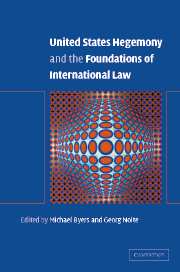Book contents
- Frontmatter
- Contents
- List of contributors
- Preface
- Introduction: the complexities of foundational change
- PART I International community
- PART II Sovereign equality
- 4 Sovereign equality – “the Wimbledon sails on”
- 5 More equal than the rest? Hierarchy, equality and US predominance in international law
- 6 Comments on chapters 4 and 5
- PART III Use of force
- PART IV Customary international law
- PART V Law of treaties
- PART VI Compliance
- Conclusion
- Index
6 - Comments on chapters 4 and 5
Published online by Cambridge University Press: 13 July 2009
- Frontmatter
- Contents
- List of contributors
- Preface
- Introduction: the complexities of foundational change
- PART I International community
- PART II Sovereign equality
- 4 Sovereign equality – “the Wimbledon sails on”
- 5 More equal than the rest? Hierarchy, equality and US predominance in international law
- 6 Comments on chapters 4 and 5
- PART III Use of force
- PART IV Customary international law
- PART V Law of treaties
- PART VI Compliance
- Conclusion
- Index
Summary
Pierre-Marie Dupuy
The chapters written by Nico Krisch and Michel Cosnard both seem excellent to me. They are rich, and at the same time raise a fundamental problem facing all internationalists today: to what extent the international system (using the term here for the international legal system, not the world configuration of power relationships) can accommodate the US aspiration to possession of a special legal status, in some sense replicating in the legal system the advantages its now unequaled power confers in the context of world politics.
It is of course rather uncomfortable to be raising such a point immediately after a dreadful trial for Americans in relation to which we all spontaneously have a feeling of truly fraternal solidarity. The destruction of the Twin Towers on the morning of 11 September 2001 was a sort of Pearl Harbor in Manhattan: indeed in a sense it goes much further, since it was the territory of the United States itself that was attacked. An implicit, widespread feeling that the American sanctuary was invulnerable was common to its leaders and its population; it vanished in a single morning, when the “New World” took a brutal blow from the old. Whatever be their power, the United States now paradoxically shares with its allies, as with its adversaries, the sense of precariousness. Is this a lesson in humility?
- Type
- Chapter
- Information
- United States Hegemony and the Foundations of International Law , pp. 176 - 194Publisher: Cambridge University PressPrint publication year: 2003
- 2
- Cited by

